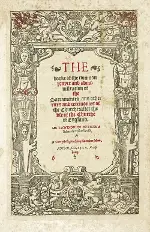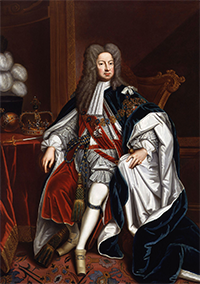The Act of Settlement 1701

The 1701 Act of Settlement was declared specifically to ensure that the throne of England continued to be occupied a member of a Protestant religion, not a Catholic. It resulted in a Protestant handover, to a king of German origin. Tensions over religious beliefs had been high in England for nearly 200 years, after King Henry VIII broke with the Catholic Church and declared himself head of the Church of England. Henry's son and successor, Edward I, had presided over a strong embrace of Protestantism, including the introduction The next English monarch, Edward's sister Mary I, was a devout Catholic and sought to restore her faith to supremacy in England. Her sister and successor, Elizabeth I, turned the tables again, embracing the Protestant faith. Charles I had angered many in his realm by not only marrying a Catholic princess but also getting involved in the Thirty Years War, which was, in part, a war of Catholic vs. Protestant. When Charles II became king, he was very careful not to antagonize those who agreed to call him back to England by openly stating his secret Catholic sympathies. (Charles II, it turned out, converted to the Catholic faith just before he died.) And so when James II (left) declared himself a Catholic in 1669, he became all the more of a problem in the eye of many English Protestants because Charles and his wife, Catherine, did not have any children and so James was the presumptive heir to the throne. When Charles died, in 1685, James did indeed ascend to the throne. Also as it turned out, James 
The 1701 Act of Settlement, precipitated by the death in 1700 of Queen Anne's only surviving child, William, Duke of Gloucester, declared that the heir to the throne was Sophia, the daughter of Elizabeth Stuart and the granddaughter of England's King James I. At the time, Sophia was married to Ernest Augustus, the Elector of Hanover, in Germany. Her son was named George. The Act of Settlement provided for more than Sophia in its order directions for succession to the throne. Her heirs were included. Other provisions of the Act:
In 1714, Queen Anne died. Sophia had died just two months before, so her son became King George I. |
|
Social Studies for Kids
copyright 2002–2026
David White



 of a Book of Common Prayer and a number of laws requiring people in England to ascribe to Protestant beliefs.
of a Book of Common Prayer and a number of laws requiring people in England to ascribe to Protestant beliefs. was not at all willing to declare the Church of England the effective sole faith of the realm. He wanted Catholics to have more rights and more of a public ability to worship the way that they wanted to. Parliament did not agree with such measures, and James dissolved Parliament. He then appointed known Catholics to high-ranking posts within the government and the military. He went a step further in 1687 by issuing a Declaration of Indulgence, which granted complete religious toleration. The following year, James had a son, seeming to guarantee yet another Catholic on the throne of England. A group of Protestant nobles had had enough of James and his favoritism toward Catholics, and they saw in the king's son a succession of Catholic monarchs. The solution, as these nobles saw it, was to find another monarch, one who wasn't Catholic. As it happened, James had an older daughter, named Mary, who had married William of Orange, a Protestant prince of the Netherlands. This led to the
was not at all willing to declare the Church of England the effective sole faith of the realm. He wanted Catholics to have more rights and more of a public ability to worship the way that they wanted to. Parliament did not agree with such measures, and James dissolved Parliament. He then appointed known Catholics to high-ranking posts within the government and the military. He went a step further in 1687 by issuing a Declaration of Indulgence, which granted complete religious toleration. The following year, James had a son, seeming to guarantee yet another Catholic on the throne of England. A group of Protestant nobles had had enough of James and his favoritism toward Catholics, and they saw in the king's son a succession of Catholic monarchs. The solution, as these nobles saw it, was to find another monarch, one who wasn't Catholic. As it happened, James had an older daughter, named Mary, who had married William of Orange, a Protestant prince of the Netherlands. This led to the  The monarch had to swear allegiance to the Church of England and the Church of Scotland. (This was another way in which the Government prohibited someone of the Catholic faith to become the monarch.)
The monarch had to swear allegiance to the Church of England and the Church of Scotland. (This was another way in which the Government prohibited someone of the Catholic faith to become the monarch.)
